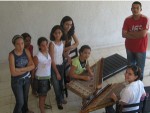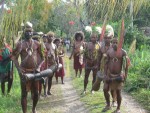Title
The drunken man staggered toward me, screaming and waving a machete. “White man!” he said in pidgin. “You have come to take away our culture! I will come back and kill you!” The villagers gathered around me protectively as he raised the meter-long knife, poised to strike. How did I end up in the middle of the jungle in Papua New Guinea with my life in danger?
Body
I was a freshman at Juilliard on September 11, 2001. Many of us wanted to help in any way we could, so when Juilliard organized a quartet to play at the 69th Regiment Armory on September 16, I jumped at the chance. Performing for soldiers as they returned from working at Ground Zero expanded my perception of music’s role in society. Could music change the world in such a way that tragedies like 9/11 would be less likely?
For the past four summers, Cultures in Harmony, the cultural diplomacy organization I founded, has attempted to answer that question. The road has been challenging: despite eight successful projects in our first three years in countries ranging from Moldova to Zimbabwe to Tunisia, it seemed for a while that we might not have funding for 2008. Now that the New York Philharmonic has gone to North Korea, explaining cultural diplomacy is easier, but many believe that Cultures in Harmony sends American musicians abroad to help people, raising the question of why we did a project in Qatar, one of the world’s richest countries. Others believe that we present outreach concerts, raising the question of why we do not present outreach concerts in New Jersey. Plus, can music really make a difference in the complex arena of international politics?
We do not go to a country to extend a hand down and lift people up. We go to extend a hand outward, to walk together in friendship towards greater mutual understanding. We aim to transform our country’s image in the world by building enduring friendships through the universal language of music.
This summer, 22 musicians from Cultures in Harmony presented projects in Qatar, the Philippines, Tunisia, Mexico, and Papua New Guinea that engaged every level of society and received national attention in each country. We taught young classical musicians in Qatar, the Philippines, Tunisia, and Mexico. We learned local music traditions and performed alongside local musicians in Qatar, Tunisia, and Papua New Guinea. We created compositions with the Umayam tribe in Cabanglasan, the Philippines; with the Yoro people in Papua New Guinea; and with orphans in Pátzcuaro, Mexico.
The egalitarian ideal characterized all our exchanges. If we taught much, we learned more: about basket weaving in Papua New Guinea, the kanun (a string instrument) in Tunisia, the educational system in Qatar, guitar-making in Mexico, and the monkey dance of the Aeta tribe in the Philippines.
The U.S. ambassadors to Tunisia and Papua New Guinea honored our projects in those countries with their involvement, and in Qatar, a sheikh ordered us some Pizza Hut and spirited me around Doha in his brand new Porsche. I appeared as a guest on Tunisia’s most popular national TV program, Morning Breeze.
Yet the highest honors were the encouraging comments of local musicians and the smiles of children, teenagers, and tribal elders with whom we forged friendships that transcend cultural differences. We organized a cultural diplomacy forum in Tunisia at which the students agreed that our project had changed their ideas about Americans. The most meaningful comment came from Amal, whose mother urged her to hand me a note she had written: “It was terrific to meet you and I hope that I will see you again next year and I’m awfully happy to know and to meet you. Besides, you’ve changed the image that I had about Americans because you’re completely different. You’re nice, kind, friendly, generous, awesome, beautiful.”
Choking back tears, I thanked Amal. Her mother smiled. “Do you know what her name means?” she asked. No, I responded. “Hope.”
Is there reason for hope? Can we move beyond violence?
The ancient Roman coliseum at El Jem in Tunisia once resounded with the roar of lions devouring Roman slaves. At our concert a couple of thousand years later, those same walls vibrated with the music of William Grant Still, the grandson of American slaves. In 1982, the corridors of the Hotel Salwa shook from the impact of the bombs dropped on the hotel when Yasir Arafat stayed there. In 2008, Mediterranean breezes wafted the sound of children practicing Beethoven through those same hallways.
Because Qatar has so few native citizens, the Qataris rely on expatriate communities to help them run the business of the country. Many of these groups find it easiest to segregate themselves. During our project in Qatar, we worked with Americans at the American School, Egyptians at the Music Arts Center, and a Syrian oud player at the school for the blind. At our urging, these communities have begun discussing how they can collaborate.
What about Papua New Guinea, the only country where one of our projects has ever encountered actual violence? Our machete-wielding assailant was eventually restrained and punished before he could harm anyone. We proceeded with the concert scheduled for that day. To dispel any doubt, I explained that our purpose was to preserve local culture, to encourage respect for the environment, and to fight H.I.V./AIDS. As the program progressed, the Yoro villagers applauded more and more. Faces that had been fearful now smiled in joy.
I hope that the machete incident remains a lone blot on our otherwise perfect safety record. But it will not deter us from our mission. We remain committed to music’s ability to dispel the clouds of ignorance that mar the relationships between cultures. We shall never fear to make music together, and we shall never fear to reach out.






